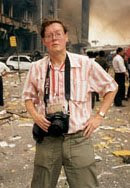 The writer and military analyst Paul Harris, who worked in Sri Lanka between 1996 ad 2002 as correspondent for Jane’s Intelligence Review and the London Daily Telegraph, spoke to SPUR yesterday with his reaction to current events in Sri Lanka. Harris was forced to leave Sri Lanka in November 2002 at 24 hours notice after the government of Ranil Wickremesinghe pulled his journalist visa. Harris was critical of the peace process with the LTTE.
The writer and military analyst Paul Harris, who worked in Sri Lanka between 1996 ad 2002 as correspondent for Jane’s Intelligence Review and the London Daily Telegraph, spoke to SPUR yesterday with his reaction to current events in Sri Lanka. Harris was forced to leave Sri Lanka in November 2002 at 24 hours notice after the government of Ranil Wickremesinghe pulled his journalist visa. Harris was critical of the peace process with the LTTE.
“The government of Sri Lanka and its President are to be congratulated on the prosecution of the war with the LTTE which has been accomplished with resolve and courage. This is in stark contrast to the supine efforts of previous governments who flinched from taking on the LTTE which had, accordingly, been able to engender a myth of invulnerability. Only six or seven years ago, it appeared that Sri Lanka might be terminally divided: a fate which would have doomed this unique and wonderful country as a sovereign entity.
“The loss of any civilian life is a matter for profound regret and, inevitably, many innocents will be victims of this final round of the conflict. However, we must not forget the tens f thousands f civilians who have already died in a war that has gone on far too long. The end of this war and the extermination of a longstanding terrorist threat must now be the priority. It is disingenuous of the British and US governments, supposedly dedicated to the worldwide war on terror, to call for a ceasefire at this vital final stage in the conflict.
“Foreign journalists who have suddenly arrived in Sri Lanka at this late stage in a conflict that has gone on for decades are questioning on channels like the BBC, CNN and Al Jazeera whether real peace can emerge from ‘the military solution’. In daily broadcasts they are claiming there is no other Tamil leadership except the LTTE. Such observations betray their limited understanding of the conflict. If there be no alternative leaders, it is because the LTTE has pursued a specific policy of the eradication of all Tamil politicians who did not adopt their creed of repression and lack of democratic choice. Some of the most brilliant members of the Tamil community have been cut down, men like Lakshman Kadirgamar, who I was privileged to know and work with, and countless others in Jaffna who bravely stood out against the brutality of the Tigers.
“I believe the enormously talented Tamil community of Sri Lanka is fully able to produce leaders of integrity and ability once one man is removed from the scene. I refer, of course, to Velupillai Prabhakaran, one of the most vicious terrorists the world has ever produced. Let us not forget, the LTTE is a one man band representing the views and aspirations of its brutal leader. The LTTE has never offered any sort of a future for the majority of Tamils.
“Hopefully, at an early date we shall see the capture or death of Velupillai Prabhakaran, who has inflicted so much misery on all the peoples of Sri Lanka. To claim him as the representative of the majority of Tamils is a travesty of reality.”
Note: In the autumn of 2004, the LTTE leadership issued a death sentence on Paul Harris for his writings and speeches denouncing them. He has been hunted for the last four years by LTTE death squads and has lived under the protection of the British secret service, shifting locations frequently and restricted in his activities. He now hopes to return to Sri Lanka at an early date.
Friday, February 13, 2009
Statement by Paul Harris on Past & Present Situation in Sri Lanka
Posted by media at 7:30 AM
Subscribe to:
Post Comments (Atom)











0 comments:
Post a Comment